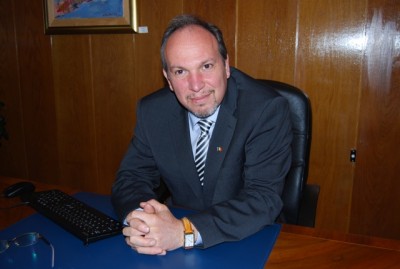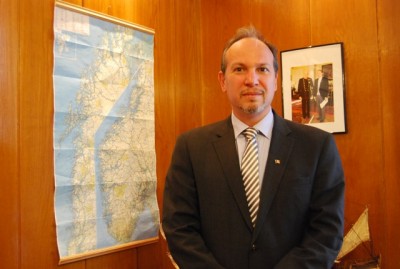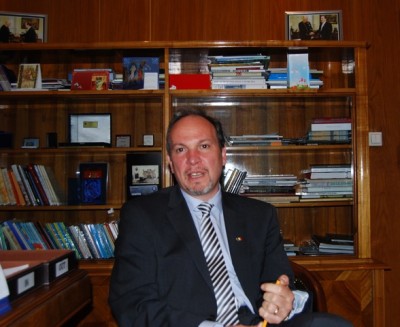“I’m cautious,” says Romania’s ambassador to Norway, Daniel Ionita, before agreeing to share his thoughts on the presence of thousands of beggars in Norwegian cities and towns. Many are from his country, and they’ve created one of the most troublesome issues now facing Norwegian officials at both the state and local levels.

Ionita readily admits he’s in an awkward situation, eager to help but bound by diplomatic restraint. He’s acutely aware that he can’t and won’t meddle in the affairs of local officials in the host country where’s he’s posted. “It’s not up to me, a humble Romanian diplomat, to tell the Norwegian authorities what to do,” he told newsinenglish.no during a lengthy interview at the Romanian Embassy in Oslo last week. “Only they can decide what are the best measures for this social issue that’s become such a big political issue.”
Ionita stresses the “social” aspect of the migrant poor, most of them Roma folk from eastern Europe and not all from Romania. “They are coming to Norway and searching for the good life,” he said. “But this is neither just a Norwegian problem nor a Romanian problem, it is a European problem. It involves 10 million to 12 million people, and it is a problem of social exclusion.”
The ambassador, who grew up in Bucharest “with many Roma children” when Romania was still firmly behind the Iron Curtain, is painfully aware that many of his fellow citizens are creating enormous challenges for his Norwegian hosts, as they beg on street corners, camp illegally around town and often leave serious littering and sanitation problems in their wake. He sees the anguish on both sides, as fellow citizens sleep under highway overpasses in appalling conditions and city politicians argue over whether to offer them more civilized accommodation.
Local quarreling continues
So far, the Conservative-led city government in Oslo (where the vast majority of migrant poor in Norway are found) has refused to provide portable toilets, food or shelter. They argue that everyone coming to Oslo must be able to provide for themselves, and that, as city government leader Stian Berger Røsland has said, “it’s not undignified” to make such demands. It wouldn’t be fair, they argue, to provide special accommodation to the Roma and not to everyone else. If people who have chosen to travel to Norway can’t take care of themselves, then they must go home, according to Røsland.
The Oslo city government also has argued that provision of even basic accommodation could encourage more migrant poor to come to Oslo, or to other cities in Norway. City officials have not agreed on how to restrict begging, within the bounds of state law, but they have banned sleeping outdoors on public property, clearing the way for police to legally rout the migrants out of city parks and other places where they’ve settled down for the night.
The situation took another, potentially dramatic turn Monday night when a group of Norwegian pastors decided to sleep outdoors in Oslo’s Sofienberg Park themselves, to protest the new ban. Police opted against routing them out, saying it “wasn’t a priority” because they’d received no complaints over the camping protest. The pastors seemed disappointed that they were denied a confrontation and publicity for their cause, and planned a meeting with Oslo politicians and Roma representatives on Tuesday.

Ionita is left to watch from the sidelines, and hear repeated accusations from both Norwegian politicians and advocates for the Roma that they are not getting the help they need in their home countries. Ingrid Schiöler, a Swedish aid worker who has tried to help Roma in Romania for years, told newspaper Dagsavisen last week that Norwegian authorities shouldn’t think they can get rid of the begging problem by making life difficult for the beggars, “because it’s much worse where they’re coming from.” Schiöler said she’s “shocked” over the lack of aid being extended to the migrant poor in Norway, just as she’s long been shocked by the extreme poverty they endure in their homelands. She and others have suggested that despite the billions of kroner worth of aid sent by Norway and other governments to assist the Roma at home, it’s not getting through to those who need it.
Not true, claims Ionita, who points to a vast array of programs in Romania aimed at keeping Roma children in school, for example, and offering job training and full scholarships to encourage university education. Ionita firmly believes that education is the key to lifting the migrant poor out of poverty and attacking the problem of their social exclusion, but he worries that cultural traditions marry off girls when they’re very young and pull children out of schools. It’s an enormous challenge, he said, for Romanian authorities to enforce truancy laws and order Roma families to send their children to school. The children then often follow the pattern set by their parents.
Breaking the ‘vicious circle’
“In order to break this vicious circle, we need to succeed in getting them into education,” Ionita said. He said there are “dedicated places” for Roma at Romanian universities, mostly unfilled. He was frustrated by a recent report in Romania media that asked Roma children what they wanted to do with their lives, and they responded that instead of going to school, “they wanted to go to Norway, not to work, but to beg.”
It’s important, Ionita noted, not to make generalizations about the Roma, though. “There are very wealthy Roma and there are destitute Roma,” he said, showing a video of a lavish Roma wedding and Roma mansions in one rural Romania town, along with video of Roma living in poverty in Bucharest. “It’s an extremely complex situation,” he said, claiming that many can get help in Romania if they want it. He concedes that some of the foreign aid flowing in for Roma can land in non-governmental organizations (NGOs) that have “lost contact with those they’re supposed to help.” He also worries that some Roma in Norway have been “manipulated, used like puppets,” or were promised rewards for coming to Norway and then get trapped. “They’re not breaking any laws by leaving Romania, we can’t prevent them from leaving,” he said. “And we’re not exporting Roma.”

He admits that he’s also concerned about the image that the migrant poor Romanian beggars are giving to Romanians in general. “Of course they are denigrating Romania, creating prejudice, it’s very sad,” he said, adding that he often feels a need to send out a message that “we are also a normal country, a normal people” with an expanding middle class and rising education levels. Last month, for example, Ionita organized an awards program for “Successful Romanians in Norway,” to show another side of his fellow citizens.
Ionita stressed that he’s “not involved” in the local decision-making processes in Norway, but confirmed he has “discussed this issue on each and every level, at City Hall, the ministries,” also in Bergen and Trondheim. He said he has spoken with Mayor Fabian Stang “on many occasions” and also attempted meetings with Roma advocates, with less success.
“Again, it is not for me to decide, but I can tell them what we are doing in Romania,” Ionita said. He said that “begging in not the solution, it’s part of the problem” and is banned in Romanian cities “because we don’t want to encourage it. It’s can be like cancer, with cells that spread.” He conceded that “I can’t say the ban on begging is successful, the problem is too complex,” but he believes it must be discouraged.
Asked what the Romanian embassy is doing to help its begging citizens in Norway, Ionita said the Romanian migrant poor “don’t come to us at the embassy for help … they’re here to get money from the Norwegians,” nor have any attempted to sleep in the embassy garden, but Ionita claimed embassy staff have provided travel assistance to, for example, a Roma woman who “claimed she’d been cheated and we provided her with papers and helped her go back home. We can help with documentation, and lending money for one-way tickets home, but not with housing or food. We are not a travel agency or a charity organization.”
Ionita said he and embassy staff, which number only five in Oslo, have also “tried to talk” to some Roma sleeping in or around the Botanical Gardens. He noted, though, that the license plates on cars in which Roma were also sleeping were not just from Romania, but from Bulgaria, Poland and Spain as well, and several didn’t speak Romanian.
“Of course I am interested, I’m touched by the stories we do hear, we’re all human,” he said. “But I have no understanding for those who claim they’re victims of the Romanian state. We have a strong commitment to helping the Roma, we do have the primary responsibility for those who are Romanians. But the most important thing is to help them help themselves.”
Views and News from Norway/Nina Berglund
Please support our news service. Readers in Norway can use our donor account. Our international readers can click on our “Donate” button:

